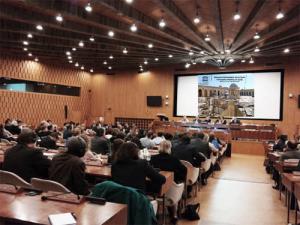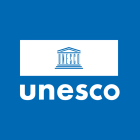UNESCO information meeting with Member States on the Syria Crisis
Discussion details

© UNESCO/P. Chiang-Joo, - Director-General Irina Bokova convened an information meeting with Member States on the Syria Crisis,
On 3 April, Director-General Irina Bokova convened an information meeting with Member States on UNESCO’s response to the Syria Crisis. Chairing the meeting, the Director-General informed the Ambassadors and Permanent Delegates about UNESCO’s efforts to address needs and challenges in the Organization’s fields of competence both in the main refugee hosting countries, as well as inside Syria.
From the onset, the Director-General emphasised the unprecedented scale and complexity of the crisis, as a refugee, a humanitarian, as well as a developmental crisis. The Director-General indicated that in this situation, the humanitarian response alone has become sufficient and unsustainable; hence the necessity to combine humanitarian efforts with an effective response to the long term development needs of the sub-region. This is where UNESCO can make a real difference, by increasing its commitment.
The Director-General provided examples of UNESCO action on the ground, which was made possible thanks to generous contributions by donors and key partners – namely the European Union, but also Bulgaria, Finland, Japan, Sweden, Switzerland, the Flanders, the Norwegian Refugee Council. She underlined the concrete achievements reached in assisting education systems in providing access to quality education to youth affected by the crisis; in advocating for the safeguarding of Syria’s cultural heritage and in promoting access to information and freedom of expression as key tools for dialogue and social cohesion in fragile and fragmented communities.
As the Syria crisis has entered its fourth year, the Director-General emphasized the need to do more. She presented UNESCO’s new YES initiative for Youth Education for Stability, a sub-regional umbrella programme focusing on youth education and engagement. She invited Member States as well as partners to support it.
The Directors of the three UNESCO offices in the sub-region – Amman, Beirut and Baghdad – then presented in further details UNESCO’s operational response and future challenges and priorities, in Syria itself, as well as in the major refugee hosting countries; Jordan, Lebanon and Iraq in particular.
During the subsequent question and answer session, Ambassadors of France, Iran, Kuwait, Lebanon, Oman, Syria, Turkey and Yemen took the floor to commend the Director-General for the response to the crisis, and offered their views of the main challenges brought about the crisis, and hopes for a better future.

Log in with your EU Login account to post or comment on the platform.